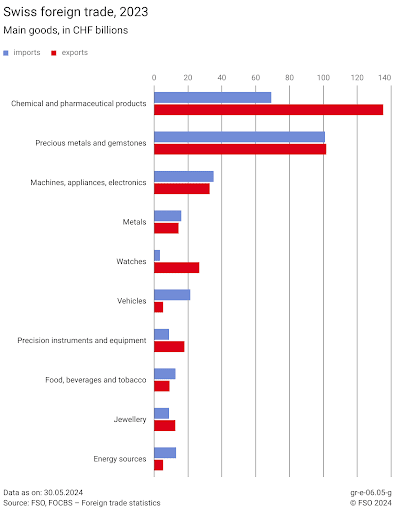
Major Industries in Switzerland to Join
Entrepreneurs interested in dynamic opportunities will find exciting and potentially profitable options in the major industries in Switzerland. The service industry dominates domestically. However, Switzerland’s manufacturing sector is also a powerful force in a range of international exports.
Switzerland boasts a robust and diversified economy renowned for its innovation, quality, and stability. Switzerland has one of the highest per capita GDP levels in the world and one that’s growing more than its neighbours. The country has carved a niche in several key industries, offering lucrative opportunities for businesses and professionals alike.
Services
Most of Switzerland’s GDP is generated by the services sector. Switzerland’s services sector is dominated by banking and tourism. Entrepreneurs looking for potentially lucrative industries in Switzerland should therefore consider industries within the services sector as main contenders.
Banking
The financial sector is hugely significant in Switzerland, contributing CHF 69 billion in added value in 2022. The banking sector also employs around 218,000 staff. According to the Swiss Bankers Association, CHF 7,846.8 bn in assets were held in Swiss banks in 2022.
Swiss banks are renowned for their privacy, stability, and the range of services they offer clients. UBS and Credit Suisse are amongst the biggest Swiss banks, with regulation coming from the Swiss National Bank and the Swiss Financial Market Supervisory Authority.
The Financial Sector and Insurance
Switzerland offers the perfect environment for entrepreneurs to set up companies in fintech or insurance. The Swiss fintech industry is booming, with 11% more fintech companies in 2023 than in the previous year. Fintech covers a broad range of financial services, from online-based payment processing companies like Unicorn Group to cryptocurrency and insurance tech.
While more companies could signal fiercer competition within the sector, fintech offers great potential in the field of artificial intelligence. Entrepreneurs who embrace the dynamic adaptation of AI and other technological advancements will find Switzerland a highly beneficial location to set up shop. Innovative fintech companies will also find an environment conducive to success in Switzerland.
Switzerland undoubtedly offers a compelling backdrop for entrepreneurs who wish to be part of a growing and innovative country. However, foreign nationals must understand how to start a business in Switzerland and the requirements business owners need to meet to set up in the country.
Tourism
Tourism is a hugely important part of the Swiss economy. Switzerland is perfectly placed to welcome tourism, with its central European location and all-round appeal. Breathtaking mountains, cool lakes, cosmopolitan cities, and stunning natural landscapes make Switzerland a favourite with tourists in both summer and winter. 2023 saw record levels of tourist spending, with tourism bringing in CHF 18.4 billion.
Technology’s impact on tourism continues to be felt in Switzerland and around the world. For example, one study suggests that offering digital payments boosts tourists’ satisfaction and may therefore raise the chance of return visits. Setting up a merchant services account with an integrated global payment gateway and a virtual terminal allows tourism providers to offer more payment options for international guests and domestic tourists who prefer to use digital payment methods.
Manufacturing
Well-renowned Swiss industries like watchmaking and medtech, plus the mechanical, electrical, and metal industries have contributed to creating a highly industrialised nation. Indeed, Switzerland is one of the global leaders in the field of advanced production processes.
Switzerland could be a compelling place to set up a manufacturing company. Apart from a close relationship between cutting-edge research centres and innovative industries, Switzerland offers the perfect backdrop to set up dynamic, high-performance production facilities.
Switzerland boasts a highly skilled workforce within the industrial sector and liberal labour laws. It offers an excellent place to set up highly automated production facilities and established trade links thanks to its close links to the European Union.
Machinery, Electrical Engineering, and Metals (MEM)
Switzerland is one of the world’s biggest exporters of machinery, selling around 75% of its MEM products abroad. MEM is Switzerland’s second biggest export and is a CHF 70 billion industry.
Swiss machinery, including tools, textiles, and machinery manufacturing, are at the forefront of innovation. This is because the country puts a strong emphasis on R&D which constantly improves their technologies and processes.
The MEM industry in Switzerland employs 8% of the country’s total workforce. Of these, the majority work in SMEs of 250 or fewer employees. This environment potentially gives prospective entrepreneurs scope to set up their own SMEs as the industry isn’t dominated by huge international companies.
Luxury Goods
Luxury goods make up another significant category of Swiss exports. An incredible 16.9 million watches were exported in 2023 aside from other luxury jewellery items, precious stones, and precious metals.
Luxury goods is an umbrella term that encompasses many Swiss goods. After all, much of Swiss manufacturing—from arms or ammunition to pharmaceuticals—is synonymous with high-quality and state-of-the-art technology. As a result, these products are typically sold at premium prices.
Another significant luxury industry is chocolate. Switzerland exported $913 million of chocolate in 2022, making it the 10th biggest chocolate exporter in the world. Focusing on the domestic market (and visiting tourists) would also be wise as the strength of the Swiss franc tends to drive up the price of Swiss exports.
Chemicals and Pharmaceuticals
According to the Swiss Federal Statistical Office, Switzerland’s leading exports in 2023 were chemicals and pharmaceuticals, amounting to a value of nearly CHF 140 billion. Indeed, the country boasts one of the world’s leading pharmaceutical industries. This industry contributes to about 50% of total exports and generates 7% of the Swiss GDP.
The chemicals and pharmaceuticals industry in Switzerland is diverse but tends to concentrate on high-value-added products like vaccines, drugs, and serums. Roche and Novartis are two major global players in pharmaceuticals. However, around half of workers in these industries are employed in SMEs. This suggests there is scope for enterprising new players within the industry.
Agriculture
The primary sector makes up less than 1% of Switzerland’s GDP. The agricultural sector, however, is the major primary sector activity and contributed CHF 12 billion in revenues in 2022. Swiss farmers also provide almost 100% of the animal foodstuffs the country consumes.
Swiss agriculture is boosted financially by the federal Swiss government. However, the industry is set to face a cut in government spending for the years 2026-2029, suggesting it may not be the best moment to join.
Switzerland: A Hub for Quality and Innovation
Switzerland’s impressive economic outlook is a testament to its commitment to quality, precision, and innovation. Switzerland’s GDP growth rate lies at 1.3% in 2024, higher than that of neighbouring France and Germany. A range of different industries represent the backbone of the Swiss economy, offering a diverse range of opportunities for businesses and professionals alike.
From the world-renowned financial sector to cutting-edge advancements in technology and healthcare, Switzerland has established itself as a global leader. As the country continues to evolve, its industries are poised for further growth and development, making it a hugely appealing country for ambitious entrepreneurs.
Published: July 3, 2024
Last updated: July 14, 2025


